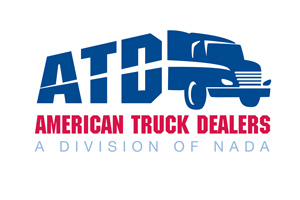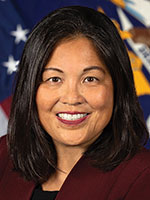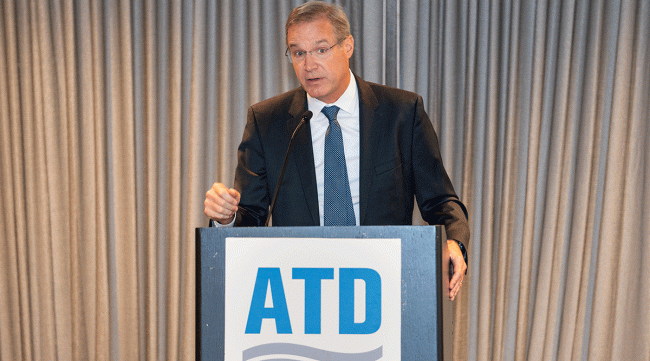ATA President Chris Spear speaks at the American Truck Dealers event. Spear urged government agencies to partner with the industry to make diesel engines cleaner while still pursuing new technologies. (SunJae Smith/American Trucking Associations)
WASHINGTON — American Trucking Associations President Chris Spear told an annual gathering of truck dealers that trucking is supportive of clean air initiatives but warned against aggressive efforts by lawmakers and regulators to compel businesses to rapidly deploy emerging vehicle technologies before it is practical to do so.
“We are pro-environment — we all want clean water, and we want clean air,” Spear said June 21 during a legislative fly-in hosted by American Truck Dealers.
Spear stressed, “We’re all-in, and we have the track record to show for it,” emphasizing that the trucking industry has worked for 40-plus years with the Environmental Protection Agency to dramatically lower tailpipe emissions from trucks. “But now we have an environmental lobby in Washington and certain states that have taken over the narrative and accelerated that timeline to making the targets unattainable. And the damage this will do to our economy, the supply chain and our industry cannot go unchecked. Timelines and targets matter, and they need to be reasonable, and they need to be achievable.”
Spear pointed specifically to a California Air Resources Board mandate requiring manufacturers to transition from selling diesel-powered trucks and vans to electric zero-emission trucks beginning in 2024, stressing this could be one of the defining issues in the trucking industry over the next 10 years.

“California is the breeding ground for all bad public policy in this country,” he said. “If these timelines and these targets go unchecked, both federal and state, our industry is going to look a lot different than it does today. There will be a lot of consolidation, and you will see an inability to service the economy, to maintain pace with the current demand.”
Spear said he supports reasonable timelines and targets to remove the remaining pollutants from trucks and believes it can be done. But instead of strict mandates, he urged government agencies to instead partner with industry to make diesel engines cleaner while still pursuing new technologies.
Spear noted that many trucks on California’s roads use engine technology that predates 2010 emissions regulations. If these trucks were replaced with newer units, he said tailpipe emissions would be reduced and air quality would improve.
To get newer trucks on the road, Spear supports repeal of the World War I-era 12% federal excise tax on new trucks.
“The average age of the fleet operating in California is one of the oldest in the country — 53% of the trucks operating now in California are 2010 or older,” he said. “If you incentivize this over the next 10 years and get that new equipment that is available into California, you remove by modernizing the fleet 83% of the emissions in the state. Why aren’t we exercising that as a bridge? I thought the goal was to reduce emissions.”

Guy Broderick of Kriska shares how he successfully combined data reports and a simple understanding of human nature to become one of the best driver coaches in North America. Tune in above or by going to RoadSigns.ttnews.com.
He added, “We can reach zero — it’s there; it will happen. But we have to use every lever available, and I fail to see why using existing equipment isn’t part of this equation.”
Spear maintained that the ATA is “technology neutral” and said he is closely watching truck makers’ research into battery/electric and alternative-fueled vehicles, including hydrogen. While positive strides are being made, he worries that the infrastructure needed to support these trucks is still years away.
Specific to electric and fuel-cell technology, Spear expressed concerns about sourcing natural resources, such as cobalt, lithium, graphite and manganese, needed for batteries. “These are all very rare minerals, and the lion’s share come from China and Congo. We need a reliable source of these materials,” Spear said.
If necessary, Spear said ATA would file lawsuits to slow down some of the timelines attached to mandates at the federal and state levels.

Su
On another topic, Spear said the full Senate should withhold a confirmation vote on acting Labor Secretary Julie Su’s nomination to get the job full time until after the 22,000 members of the International Longshore and Warehouse Union ratify a tentative, six-year agreement that Su reportedly helped get over the finish line. Earlier this month, Su traveled to San Francisco and met with the union and management team and helped advance a tentative labor agreement.
“I applaud her, but be mindful it’s a tentative agreement, and we had a tentative agreement on the rails just a few months ago,” Spear said, noting the railroad workers eventually turned down their contract before Congress imposed a settlement under the Railway Labor Act.






